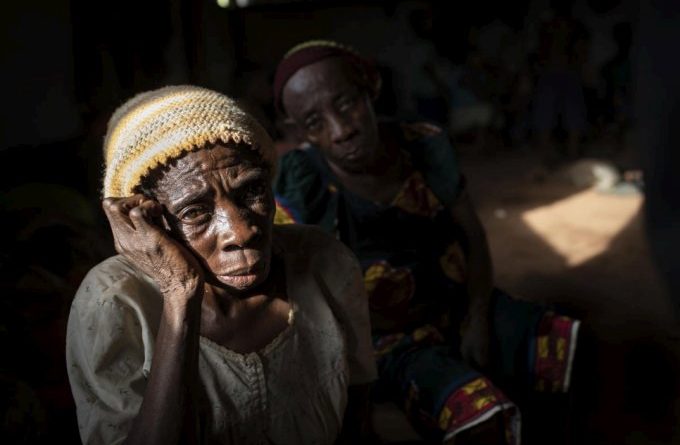Hardships multiply for older refugees amid COVID-19 pandemic – World
Physical decline, deepening economic hardship and isolation make life tougher for older people, who comprise four per cent of the forcibly displaced population worldwide.
By UNHCR staff | 01 October 2020
SAN JOSE, Costa Rica – Despite suffering knee problems and hypertension, 69-year-old Nicaraguan asylum-seeker Esperanza* used to get up at dawn every day to pick coffee to support her family in Costa Rica.
“Being old makes it hard to do the kinds of jobs we have to do to keep food on the table,” says the grandmother of 10 after a government crackdown on street protests in her native Nicaragua.
“Picking coffee is very physically demanding, and at our age it’s very difficult to be out there in the fields all day, sometimes freezing and shivering under the pouring rain. If we were younger, it would be easier,” she said.
As older people seeking safety in a foreign country, life was already “a daily struggle” for Esperanza and her husband, who also fled to Costa Rica. And now with the COVID-19 pandemic, that situation has only grown tougher.
As lockdown hit, Esperanza’s work dried up and she and her husband fell behind on payments for the room they rented and were threatened with eviction.
UNHCR, the UN Refugee Agency, provided them with assistance that allowed them to pay the back rent they owed and keep a roof over their heads.
Older asylum-seekers like Esperanza make up some four per cent of the population of concern to UNHCR around the world. From the Americas, to Africa and Asia, many report an already difficult life getting even harder as the pandemic grinds on.
In southern Nigeria, 68-year-old refugee James Orock received financial help from his son in China since fleeing violence in Cameroon in February last year. But as his son’s business suffered in the pandemic, he no longer receives the remittances he relied on.
“Things (prices) have just skyrocketed,” says James, speaking at a settlement in Cross River State where UNHCR has provided information and support with hygiene to protect against coronavirus. Additionally, it has distributed pepper, okra, yam and pumpkin seeds that can be sown and harvested within a month to supplement food.
“We pray that it should not continue, otherwise some of us will not cope,” he adds.
Pandemics and their impact on older people like Esperanza and James are the focus of this year’s International Day of Older Persons on 1 October.
“The COVID-19 pandemic is causing untold fear and suffering for older people across the world,”UN Secretary-General António Guterres said back in May.
“Beyond its immediate health impact, the pandemic is putting older people at greater risk of poverty, discrimination and isolation. It is likely to have a particularly devastating impact on older people in developing countries,” he added.
Among older refugees struggling with poverty and discrimination is 69-year-old Salvadoran cook Francisco, who fled to neighbouring Guatemala after street gang members murdered his wife and son in front of him.
In Guatemala, Francisco managed to find a job, but the business shuttered during the pandemic. When he returned to work after the lockdown restrictions were eased, the boss said his services would no longer be needed.
“I believe she was discriminating against me because of my age,” he said. After being let go, Francisco resorted to the only way of making a living he could think of: selling food that he prepares in his small rented room as part of a programme supported by UNHCR through its partners in Guatemala.
“I never imagined having to live through something like this,” said Francisco. “I’ve had to start over. And at my age, it’s hard to find work.”
Millions of older people worldwide are at greater risk of death from COVID-19, and many have reduced their social contact to cut the risk of infection.
Aside from anxiety for his health, 84-year-old Bhutanese refugee Padma Lal Timsina frets that he is becoming increasingly cut off from the family support that is so important to him in old age at the Beldangi refugee settlement in Nepal.
At one time he was surrounded by an extended family of 14 at the settlement where he has lived since 1991. But nine relatives were resettled to a third country and some who remain live in a separate part of the camp.
“Before this disease came here, we used to gather around the peepal tree, chitchat, share jokes over a cup of tea and keep ourselves entertained. Now we are confined to our house,” he said.
The UN has urged governments to target policy and other measures to raise awareness of the special needs of older people. At the same time it asks for recognition for the contributions older people make to their own health and broader responses to the pandemic.
With reporting by Austin Ramírez Reyes in San José, Costa Rica; Alicia Álvarez Gil in Guatemala City; Deepesh Das Shrestha in Damak, Nepal and Tony Aseh in Nigeria. Writing by Tim Gaynor and Matthew Mpoke Bigg.
*Name changed for protection reasons.




